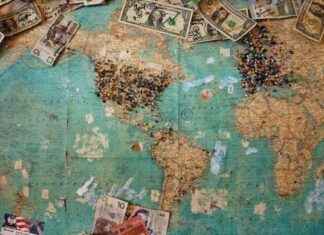The Government has been warning of the instrumentalization of migration but without mentioning Rabat before or now Algiers
MADRID, 11 Jun. (EUROPA PRESS) –
The Government has set itself the objective that NATO not only look to the east but also to pay attention to the south, wielding above all the instability and the growing terrorist threat in the Sahel, but also with its sights set on Morocco and Algeria, although without mention them expressly so as not to make the atmosphere even more rarefied.
The objective of expressly mentioning the southern flank in the Strategic Concept that the Atlantic Alliance will approve at the Madrid summit, where what is considered to be the threats for the next decade will be collected and how to deal with them will be considered, seems to have been achieved.
This was implied by the President of the Government, Pedro Sánchez, during his appearance on Wednesday in Congress, assuring that this was the objective that had been set and “that is collected”. The mention, according to government sources, will be a paragraph within the text, whose wording is being negotiated paragraph by paragraph by the ambassadors to NATO.
The achievement, if materialized, is the result of an intense campaign in which the Government has been working for months, mainly the Minister of Foreign Affairs, José Manuel Albares, to try to make the rest of the allies see that there are also threats in the southern flank that lie in wait for NATO.
The Government has even recruited King Felipe VI for this who, on the occasion of the 40th anniversary of Spain’s entry into NATO and before the members of the Atlantic Council -who are in charge of drafting the Strategic Concept-, also drew attention on the south flank. “Our collective security also requires that the Alliance pay increasing attention to the challenges of the southern strategic direction,” the monarch said.
In its arguments, the Government has stressed at all times that it is fully aware of the threat posed by Russia to the so-called eastern flank — the Baltic countries, Ukraine and other former Soviet republics such as Moldova or Georgia, among others — and therefore it is solidarity with these countries, as evidenced by its participation in NATO missions in this area.
This solidarity has been demonstrated by the fact that, as a result of the Russian invasion of Ukraine, Spain has increased the deployment of troops in missions such as the one in Latvia, which has gone from 350 soldiers to 600 in June, or the surveillance operations of the Baltic airspace, where there will be a total of three deployments this year.
In exchange, as Sánchez explained in Congress, “if something happens, and hopefully it doesn’t, on the southern front, we will also ask for that solidarity”, thus reiterating the argument that they have been repeating first as a result of the migration crisis experienced by Poland and the Baltic countries sponsored by Belarus and then after the Russian invasion of Ukraine.
The situation in the Sahel is an issue that has worried the EU for years and is therefore not new to the allies, many of whom have a military presence in countries in this region. However, in the wake of the double military coup in Mali and the coup in Burkina Faso earlier this year, concern is growing.
Affiliates of Al Qaeda and the Islamic State — the Support Group for Islam and Muslims (JNIM) and the renamed Islamic State in the Sahel — operate in the region. In the last two years, the jihadists have expanded their activities increasingly to the south, with Burkina Faso as the great epicenter of violence, and with their sights set on the countries of the Gulf of Guinea, in particular Benin, Togo and the Costa de Ivory.
But without a doubt the factor that has set off all the alarms, and that the Government is now using to vindicate its position, is the presence of Russian mercenaries in Mali. The military junta’s decision to turn to the Russian firm Wagner — owned by an ally of Russian President Vladimir Putin — further strained the relationship between Bamako and Paris and has culminated in a request that French troops leave the country. , a withdrawal that was already underway in any case.
There is also concern about the impact that the war in Ukraine could have on this region, one of the most affected by climate change, especially due to the cereal supply problems that the conflict is bringing with it and that could aggravate food insecurity and generate turn social instability. The consequence could end up being new flows of refugees and displaced people, many of whom could set their sights on Europe.
At the same time, according to Albares on Thursday in a meeting with journalists on the occasion of the next NATO summit, “threats are more diverse than ever and require a more united and coordinated response between partners and allies.”
“We have seen how energy pressure is used on the sovereignty of our countries, how migrants are instrumentalized in a totally unacceptable way to pressure our borders, how cyber attacks are multiplying, including those against critical infrastructure,” he stressed.
“We have seen it on the eastern flank and we can perfectly witness the use of these threats on the southern flank,” he warned, defending that “the Alliance must respond to this, all united, in a determined and firm manner.”
Already during the crisis experienced last autumn due to the massive arrival of migrants from the Middle East to several EU countries encouraged by Belarus, the Government showed its solidarity and warned that the use of immigration as a tool of pressure could also come from the south.
So, still immersed in the crisis with Morocco, the Executive still had fresh in its memory the entry of more than 10,000 migrants into Ceuta between May 17 and 18, encouraged by the inaction of the Moroccan security forces in full tension with the country neighbor for the reception of the leader of the Polisario Front, Brahim Ghali, and with the refusal to recognize the Sahara as Moroccan as a backdrop.
However, every time he spoke of this threat while the situation on the borders with Belarus lasted, he avoided mentioning Morocco, in an attempt not to further heat things up. Now, the relationship with the Alaouite kingdom is in a new stage, after the support for the Moroccan autonomy plan for the Sahara, and Sánchez himself highlighted the progress made in the two months that have elapsed.
But those who know Morocco have not failed to warn the Government at this time that Rabat could return to its old ways in the future, after having verified that the use of immigration as a tool of pressure, as well as the suffocation to which it has been subduing Ceuta and Melilla, could bear fruit.
The resolution of that crisis unleashed another with Algeria, which immediately withdrew its ambassador and which this week has gone further and, in addition to suspending the Friendship Treaty, has canceled foreign trade operations with Spain.
For now, Albares has said that the gas supply has not been affected by the measure – Algeria had so far assured that the shipment was guaranteed, although the state-owned Sonatrach threatened to raise the price – and the Minister of the Interior, Fernando Grande -Marlaska, has been confident that cooperation in security matters will be maintained, highlighting the 35% decrease in the arrival of migrants that can be attributed to the ‘Algerian route’.
However, when talking about energy and migration as a pressure tool, Albares avoided mentioning Algeria as happened before with Morocco, although coming from the south this threat can only come from these countries, or from Libya, which is also facing a severe instability.








